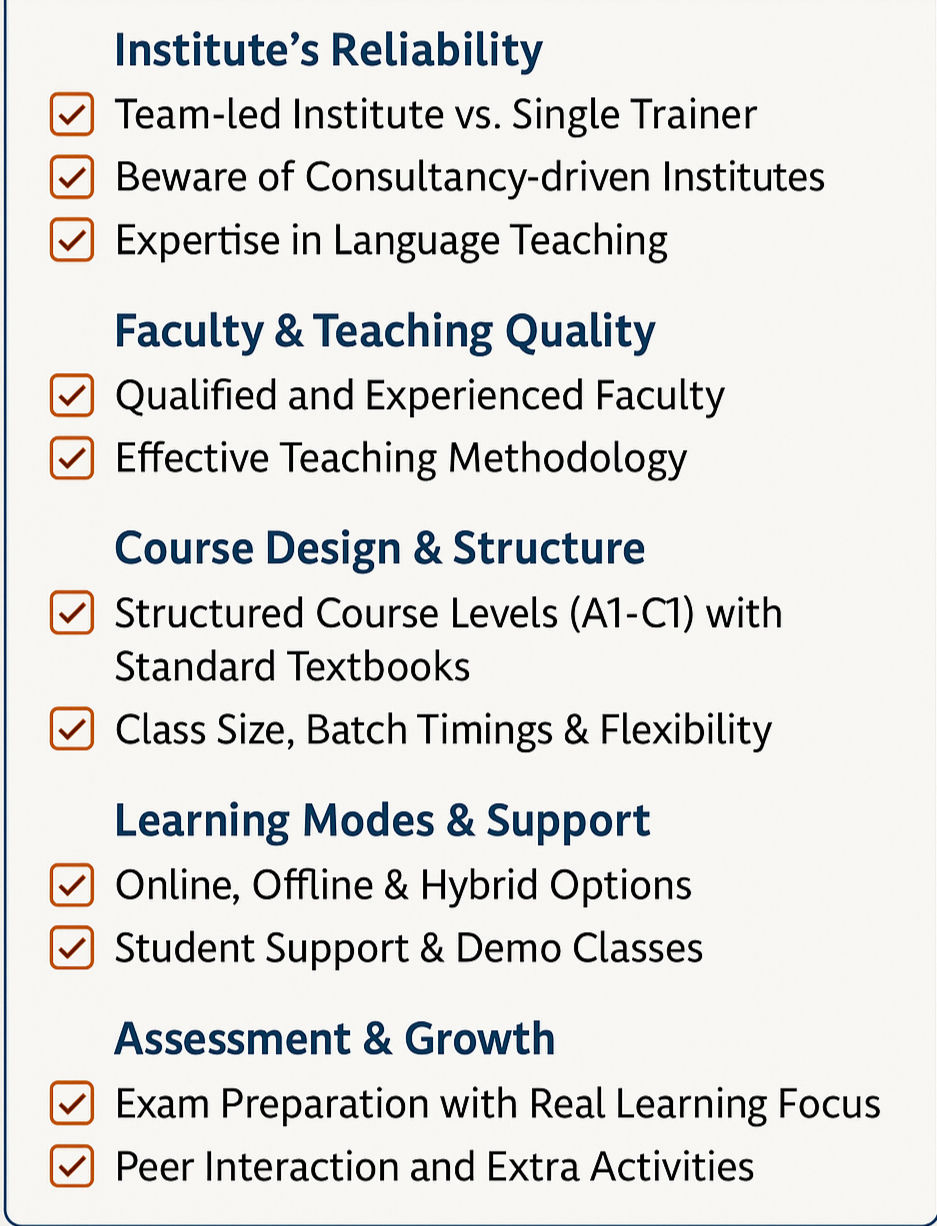What to Check While Choosing a German Language Course or Institute
- Admin Abyaas
- Sep 1, 2025
- 3 min read
Learning German can open doors to higher education, jobs, and settlement opportunities in Germany, Austria, and Switzerland. But your success depends heavily on the institute or teacher you choose. Many learners waste months—and money—because they enrolled in the wrong place: under-trained teachers, consultancy-driven setups, or institutes that only push for certification without real skills.
To help you avoid these pitfalls, here’s a practical checklist of what you must look for before joining a German language course.

What to Check While Choosing a German Language Course or Institute
1. Institute’s Reliability :
Team-led Institute vs. Single Trainer – A structured team ensures stability, continuity, and consistent quality, while a single-trainer setup may depend too much on one individual.
Beware of Consultancy-driven Institutes – If the main agenda is visa or admissions, language teaching often becomes secondary. Always check whether the institute is genuinely focused on teaching German or just using it as an extra service.
Are They Experts in Language Teaching? – Do they truly specialize in German, or are they just adding it as an additional service?
Don’t Just Go by Ratings/Reviews – Online reviews can be faked or scripted. Read carefully to see if they sound authentic. Explore their social media presence (especially YouTube) to judge the quality of their teaching.
2. Faculty & Teaching Quality
Qualified and Experienced Faculty – Teaching experience matters more than just having a B1/B2 certificate. A teacher with training in pedagogy can deliver much better results. After all, even nursery teachers undergo training—so why not German teachers?
Effective Teaching Methodology – The right balance of textbooks, grammar explanations, practical communication, and interactive activities makes a big difference in how quickly and confidently you learn.
3. Course Design & Structure
Structured Course Levels (A1–C1) with Standard Textbooks – A clear syllabus is better than dumping endless resources. More material often leads to more confusion. Language learning has its pace—you can’t rush beyond certain limits.
Class Size, Batch Timings & Flexibility – Smaller batches ensure personal attention. Also check if they offer both regular-paced and intensive course options to match your needs.
4. Learning Modes & Support
Online, Offline & Hybrid Options – Flexibility matters. Good institutes provide recordings for missed classes so you don’t fall behind.
Student Support & Demo Classes – Mentorship, regular doubt-clearing, and the option to try demo classes show that the institute cares about your progress before and after enrollment.
5. Assessment & Growth
Exam Preparation with Real Learning Focus – Certifications are important, but real skills matter more. Many candidates return from Germany even with certificates because they lacked practical speaking ability. A good institute trains you for both.
Peer Interaction and Extra Activities – Speaking clubs, cultural sessions, role plays, and group practice help you gain the confidence to actually use German in daily life.
Choosing the right German language course / institute is about much more than fees or quick promises of certification. It’s about finding a place that gives you structure, skilled teachers, genuine support, and opportunities to practice real communication. Don’t just settle for “certificate coaching”—invest in an institute that will truly prepare you for life in Germany.
At Abyaas Institute, we’ve designed our German language training for study in Germany with all these aspects in mind—qualified faculty, structured syllabus, flexible online/offline options, and a strong focus on real speaking skills. Whether you’re preparing for Goethe, TELC, or ÖSD certification, or aiming for the Opportunity Card, our courses build both certification success and real communication skills.


Comments